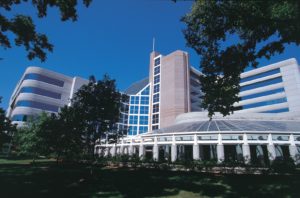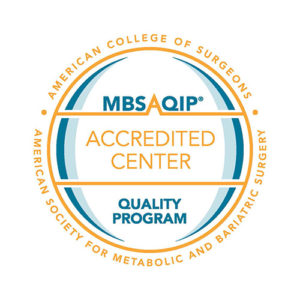





Located on the TriStar Centennial Medical Center campus in the heart of Music City, TriStar Center for Weight Management is part of a comprehensive healthcare facility delivering excellence in care to those affected by obesity. Our approach to treatment combines evidence-based medicine with an individualized plan of care. We offer a wide array of options including weight loss classes with the dietitian, medical weight loss programs and bariatric surgery treatment options. We are an accredited comprehensive center through the Metabolic and Bariatric Surgery Accreditation & Quality Improvement Program (MBSAQIP) in association with the American College of Surgeons (ACS).
Watch this informational video to learn more about weight loss surgery and how it can improve your overall health.
You will learn about the causes and effects of obesity, types of surgeries and their benefits and what you can expect before, during and after a procedure.
If you would like to speak with an experienced nurse who can answer any questions you may have, call (615) 342-1231 or email us at CENT.Bariatrics@hcahealthcare.com.

Our center is devoted to ensuring your needs are met throughout your weight loss journey. We know for you to be the most successful long-term, you need to continue to access our weight loss services long-term. We believe our “one stop shop” approach with all services located in one building allow for easier visits. Check out our robust class schedule to remain an active participant in YOUR journey!
If your insurance does not cover bariatric surgery, we do offer competitive self-pay options. Select the Pathway To Surgery tab at the top of the opening web page and choose Self-Pay in the drop down menu. If you are interested in self-pay, you must fill out a new patient form located via the BLUE New Patient Form tab at the top of every webpage on cmcwls.com, and an Insurance Specialist will contact you via email. You will also need to view an online informational seminar. You can register by selecting the RED Webinar Registration tab at the top of every webpage on our website.
Our comprehensive program strictly adheres to the National Institutes of Health guidelines for criteria for bariatric surgery. Each patient must examine their own insurance policy to determine if benefits are available for obesity surgery. After you have filled out and submitted the new patient forms that are located via the BLUE New Patient Form tab at the top of every webpage on cmcwls.com, an Insurance Specialist will verify your insurance benefits and contact you via email regarding coverage and next steps.
To quality for surgery patients must have a Body Mass Index (BMI) greater than 40. Patients with a BMI of 35-39 must also have a diagnosed co-morbidity such as hypertension, diabetes or sleep apnea, to name a few. To find out your BMI, under the tab: Pathway To Surgery, select “Am I A Candidate / Calculate Your BMI” from the dropdown menu and follow the instructions.
If your insurance does not cover bariatric surgery, we do offer competitive self-pay options. Select the Pathway To Surgery tab at the top of the opening web page and choose Self-Pay in the drop down menu. If you are interested in self-pay, you must fill out a new patient form located via the BLUE New Patient Form tab at the top of every webpage on cmcwls.com, and an Insurance Specialist will contact you via email. You will also need to view an online informational seminar. You can register by selecting the RED Webinar Registration tab at the top of every webpage on our website.
We believe after researching on their own and attending a seminar, most patients have an idea of which procedure will work best for them. Some individuals are not comfortable with the idea of a foreign body being placed, so they know they prefer not to have a band. Some individuals are not comfortable with having a portion of their intestine bypassed, so they choose not to have a bypass. A procedure, called vertical sleeve gastrectomy, may represent the best of both worlds for patients who want restriction but without the need for multiple adjustments as with a gastric band.
The answer is it depends. The decision to place a drain during surgery is made by the individual surgeon. If you do have a drain placed at the time of surgery, it will be removed at your first follow up appointment. While some may view having a drain as an inconvenience, it is generally not painful. If needed, the nurses will show you how to empty the drain and change the dressing prior to going home.
Eating to many carbohydrates (rice, bread, pasta) or simple sugars (such as sugar, honey, and corn syrup) or high-fat foods can cause dumping syndrome in patients who have had gastric bypass surgery. This occurs when these products, which have a small particle size, are “dumped” from the stomach into the intestine at a rapid rate. Water is pulled into the intestine from the bloodstream to dilute the sugar load and excess insulin is released to process the sugar. This causes symptoms that can include rapid heart rate, hot flashes or sweating and clammy skin, and feeling dizzy or light-headed. Dumping syndrome will resolve on its own in 30 minutes to an hour.
You are usually able to return to work within a couple of weeks of surgery. If you have a more physical job, then you may need to be off as long as 4-6 weeks.
Discharge from the hospital is individualized to how you are doing. In general, our gastric band patients go home the day of surgery.
Sleeve gastrectomy and gastric bypass patients will go home within two to three days of surgery.
Duodenal switch patients will go home within three to four days of surgery.
You may shower within a couple of days of surgery; however, we prefer you do not take a tub bath or get in the pool until your incisions have healed and any drain sites have closed. This is usually after your one week follow up visit.
You may resume driving once you have been off all narcotic pain medication for 24 hours. Keep in mind that for the first week or so after surgery, you may still feel pretty sore across the abdomen and that may impede your ability to brake quickly or suddenly.
After laparoscopic surgery, you are typically able to return to your normal activities within two weeks; prior to that time, we recommend you do not lift more than twenty pounds.